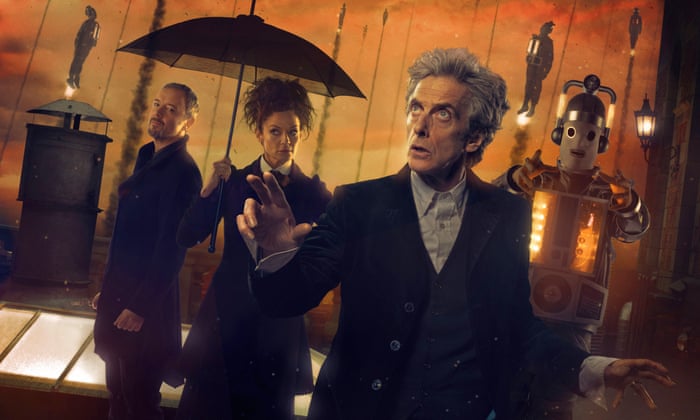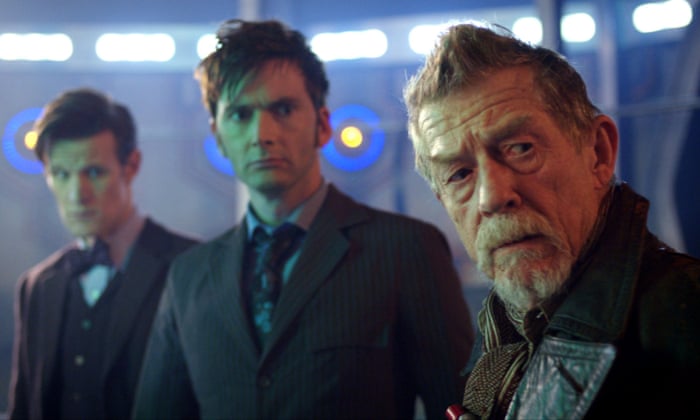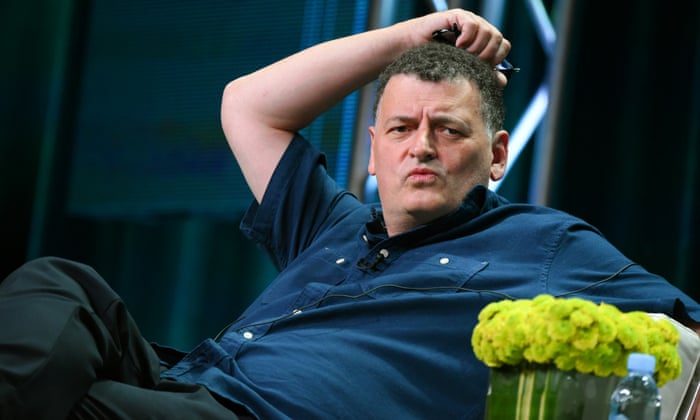Doctor Who: Steven Moffat’s highs, lows and time-travelling hijinks

With that shocking opening sequence of the regeneration of the 12th Doctor, and the fate of Bill Potts hanging in the balance, last week’s episode of Doctor Who left lots of unanswered questions. But we know one thing for sure: Saturday’s season finale, The Doctor Falls, will be the last episode of a regular series with Steven Moffat at the helm. While we wait to find out how the Doctor will escape, and who he or she will be next, it’s the perfect opportunity to assess Moffat’s seven years running the show.
Moffat had a task like no other. In the 1960s, 70s and 80s, producers and script editors came and went. But nobody had the iron grip of both showrunning and writing that Russell T Davies did when the BBC revived the show in 2005. The new Doctor Who was very much Davies’ vision – and Moffat was the first person to step into those shoes.
Having written several stand-out episodes of the Davies era, anticipation was high. And it was a bright start: The Eleventh Hour remains one of the finest introductions to Doctor Who. After almost five decades as a teatime show aimed at families, we were introduced to a brand-new Doctor Who through the eyes of a child. The “fishy custard” sequence with Matt Smith and a young Amy (Karen Gillan) is hilarious and ridiculous, then suddenly scary, and his departure (combined with her patient waiting) heart-rending. It’s all the things you want in Doctor Who.
Moffat’s first team – Smith, Gillan and Arthur Darvill as the Doctor, Amy and Rory – had great screen chemistry, and he has since cast two other Doctors, with the inclusion of John Hurt. They’ve all been white men, a situation that is increasingly untenable, but they have all excelled in the role. Smith brought a youthful face, with eyes that managed to convey the Time Lord’s age, whereas Peter Capaldi has brought the opposite – an older face and eyes that sparkle with the mischief of youth.
It has become common for fans to say that Capaldi has been good in the role, but hasn’t had the best stories to work with. That ignores episodes such as Listen, Heaven Sent/Hell Bent, Flatline, and the stupendous anti-war speech in two-parter The Zygon Invasion/The Zygon Inversion. It is a shame though that Moffat opted for two seasons of Capaldi paired with Jenna Coleman’s Clara, rather than allow the new Doctor to explore the universe with a brand new companion, as Smith got to do.
There have been some absolute clunkers along the way. The Curse of the Black Spot and Robot of Sherwood are notorious. And the plot resolution of Kill the Moon – that Earth’s satellite turns out to be an egg – has become a running joke on social media to express absolute disbelief. But no era has been immune to duff episodes; even the Davies years gave us Fear Her and Planet of the Dead.
Credit to an ambitious Moffat for enticing writers of the calibre of Richard Curtis, who penned the exquisite Vincent and the Doctor, and Neil Gaiman, whose extraordinary The Doctor’s Wife featured Suranne Jones’s virtuoso performance as the Tardis trapped in the baffling experience of being a living being.
A criticism of his era is that he has often offered up complicated plots that are difficult to follow, and resolved them with some unsatisfactory reset button. In fairness, the show does have a rich history of convoluted stories fixed with a wave of the sonic screwdriver. But if you’ve ever tried explaining to a child who River Song is and how her timeline works, you’ll appreciate how overly complex the plots have become.

Moffat should be praised for his handling of the show’s 50th anniversary. Previous on-screen celebrations have been hit and miss (nobody holds much affection for the 30th anniversary Doctor Who/EastEnders crossover) but Moffat absolutely delivered. His hand may have been forced with Ninth Doctor Christopher Eccleston’s refusal to be involved, but by pulling a mysterious incarnation of the Doctor we’d never met before out of the bag, Day of the Doctorwas both a celebration of the show’s past and a pointer to the future.
As a bonus, fans got the unexpected treat of a mini-episode with Paul McGann, who got more precious minutes as the Doctor, and a tear-jerking cameo by everybody’s favourite 70s Doctor, Tom Baker. That McGann and Baker’s returns had been kept under wraps made them even more special.
Under Moffat, the show has also coped with the pressures of being a globally marketable commodity for the BBC. Screenings of episodes in cinemas and world promotional tours have upped the ante in terms of promotion, and eclipsed the effort put in by Davies. Sometimes it has caused the programme to suffer on-screen. The ill-fated Teletubbies redesign of the Dalek was a bad misstep. And there have been several episodes, such as Dark Water, where beautiful production design details gradually hinting at the reveal of a returning foe have been blown away by publicity screaming about who is making a comeback.
Perhaps the most consistent criticism has been Moffat’s poor grasp of writing women characters. Whether River Song, Clara or Madame Kovarian, the enigmatic female character trope has consistently aggravated fans.

It feels as if Moffat has made some effort to create more diverse female roles. Despite some foreboding about him writing a gay woman, Bill Potts has been genuinely fresh. And he has made huge strides in setting up the possibility that a woman could play the Doctor in the future: during Hell Bent, we’ve explicitly seen Ken Bones’s white male Time Lord regenerate into T’Nia Miller’s African-Caribbean Time Lady.
Ultimately though, the job of the showrunner has always been to hand it over in a decent state to the next one. Moffat has, without a doubt, achieved this. Overnight ratings may be down from the heyday of the show’s relaunch, but the way people watch TV has changed significantly in the intervening 12 years. The Audience Appreciation Index figure for Doctor Who is still regularly in the mid-80s.
So it is the end, but, as ever with Doctor Who, the moment has been prepared for. Chris Chibnall will be in charge next year, but Moffat is handing over the keys to a show still in decent shape. When the BBC declared that Doctor Who was coming back in the early 2000s, who would have dreamed it would still be running over a decade later, with Christopher Eccleston, David Tennant, Matt Smith, John Hurt and Peter Capaldi all taking on the iconic role? Steven Moffat has been vital in that.